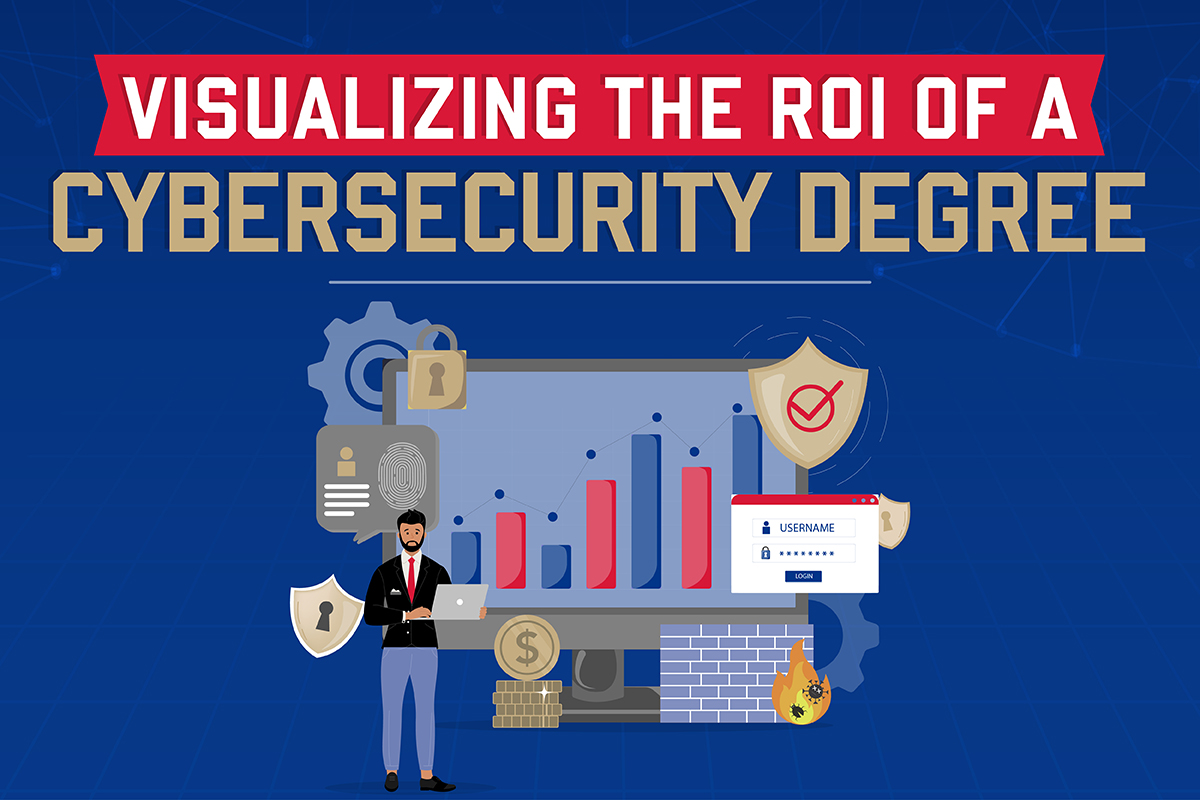Is a Cybersecurity Certificate Worth It?
Written by:
University of Tulsa
• Dec 13, 2023

As the world moves further into the digital age, the importance of cybersecurity has become paramount to organizations, opening up job opportunities. CyberSeek reports that from September 2023 to August 2024, there are just 83 cybersecurity workers available for every 100 jobs in need of qualified cybersecurity professionals. Companies are looking to fill these spots with qualified talent. One of the ways a person can demonstrate qualifications is to obtain certification. Even so, with potential opportunities tilted in their favor, it may be tempting for individuals to wonder if a cybersecurity certificate is worth it.
The answer is a resounding yes. According to a 2022 study from ISC2, 55% of cybersecurity positions require vendor-neutral and 38% require vendor-specific cybersecurity certifications, so earning a certification can potentially help expand career opportunities. Certifications also validate expertise and competence in specific areas of cybersecurity. They’re tangible evidence of knowledge and skills, instilling confidence in employers, colleagues, and clients. For those seeking career advancement, certifications showcase a commitment to professional development and can help professionals stand out among their peers.
Complementing certifications with an advanced degree in cybersecurity can be a game changer for those aspiring to elevate their cybersecurity career. While certifications validate practical skills and specialized knowledge, professionals may also find value in an advanced degree in cybersecurity that offers a comprehensive understanding of the field, encompassing a curriculum that teaches leadership and technical expertise.
Cybersecurity Certification Benefits
Earning a cybersecurity certification offers numerous advantages for individuals aspiring to excel in the field. For example, these certifications can provide a solid foundation and an in-depth understanding of various cybersecurity concepts, tools, and techniques, ultimately equipping individuals with the necessary skills to advance in their roles.
Another significant benefit of earning a cybersecurity certification is the increase in career opportunities. Certifications often make jobseekers more employable and could open the door to a broader range of job prospects, as they indicate a specific level of objective knowledge that employers consider when making hiring decisions. Employers often value candidates with industry-recognized certifications because they’re tangible evidence of their competence and commitment to professional growth.
As certifications often help holders secure higher-level positions, they can also help increase earning potential and improve job security. The cybersecurity job outlook is also positive, with the U.S. Bureau of Labor Statistics (BLS) projecting job growth of 33% between 2023 and 2033. Certifications also signify a dedication to ongoing professional development, which is beneficial in a field that demands continuous learning and adaptation.
Benefits of Advanced Education
At first glance, an individual looking to get into cybersecurity may need to decide between earning a cybersecurity certificate vs. a degree. This is not the case. While earning a cybersecurity certificate is worth it because it demonstrates practical skills and knowledge in specific areas of cybersecurity, a comprehensive education can provide a broader understanding of foundational aspects of cybersecurity. A master’s degree may not be required for every position, but it can help indicate to employers a level of knowledge that helps a job candidate stand out and can therefore help individuals who work in cybersecurity advance their careers.
Prepares Students for Certification
Some certifications may require individuals to possess relevant work experience or a degree to qualify, and many of those certifications allow for the experience earned during a degree program to act as a substitute for work experience. Pursuing a Master of Science (M.S.) in Cyber Security can be instrumental in preparing students for certification success by establishing the foundational knowledge that certifications can build upon.
Builds Skills and Experience
Earning an M.S. in Cyber Security exposes individuals to several key learning outcomes that can equip individuals with a holistic understanding of the discipline, allowing them to tackle complex challenges and think critically in real-world scenarios. Additionally, a master’s degree program often incorporates hands-on projects, research opportunities, and collaboration with industry experts, further enhancing practical skills and problem-solving abilities.
Gives a Competitive Edge
By pursuing a master’s degree, individuals can gain a competitive edge in the job market and increase their chances of earning valuable certifications. Advanced education has also become more of the norm in cybersecurity. The 2022 Cybersecurity Workforce Study from ISC2 shows that 43% of cybersecurity professionals hold a master’s degree.
Increases Earning Potential
Helping with career advancement can also increase earning potential, which could further make earning an M.S. in cybersecurity worth it for some people. According to Payscale, the median annual salary for individuals with a master’s in cybersecurity is $96,000 as of March 2024. Comparatively, Payscale lists the median annual salary for those with a Bachelor’s in cybersecurity at $78,000 as of September 2024.
What Certifications Do I Need for Cybersecurity?
When considering how to advance a career with a cybersecurity certification, understanding the range of certifications available and their specific focus areas is important. Each certification offers unique benefits and caters to different job specialties, and by choosing the right one, professionals can better tailor their knowledge to specific career goals. Furthermore, considering the cost associated with each certification can help prospective professionals make informed decisions.
Consider a few popular cybersecurity certifications.
Microsoft Security, Compliance, and Identity Fundamentals
The Microsoft Security, Compliance, and Identity Fundamentals certification helps validate foundational knowledge in security, compliance, and identity (SCI) related to securing Microsoft platforms and services, such as Microsoft 365 and Azure. This certification also serves as an excellent starting point for those looking to gain a solid understanding of fundamental areas, such as networking and cloud systems.
Microsoft Security, Compliance, and Identity Fundamentals Cybersecurity Certification Cost
The Microsoft Certified: Security, Compliance, and Identity Fundamentals certification can be completed by taking one exam, which costs $99 per attempt. Microsoft also offers free practice assessments to help ensure adequate preparedness. This certification also has no expiration date, so no annual or repeat cost is required to maintain this certification.
ISACA Cybersecurity Fundamentals
The ISACA Cybersecurity Fundamentals certification delivers a comprehensive understanding of entry-level cybersecurity concepts: the cyber threat landscape, secure administrative access, standard security operations, and cyber threat responses, to name just a few. Because it primarily covers entry-level cybersecurity concepts, this certification benefits individuals seeking general field knowledge.
ISACA Cybersecurity Fundamentals Cost
The ISACA Cybersecurity Fundamentals certification exam costs $220 per attempt. For those who become ISACA members, it’s discounted to $160. This certification also doesn’t expire or require recertification, making it a potentially valuable long-term investment.
CompTIA Security+
The CompTIA Security+ certification is an entry-level certification that covers essential cybersecurity skills and knowledge. It validates the ability to perform core security functions and demonstrates competency in network security, threats and vulnerabilities, identity management, and cryptography. For those looking to build general and foundational cybersecurity knowledge, the CompTIA Security+ certification can be an excellent choice in opening up cybersecurity opportunities in the industry.
CompTIA Security + Cybersecurity Certification Cost
The cost to take the CompTIA Security+ exam is $404, making it one of the more expensive options for certification. This certification also lasts only three years before expiring and will require renewal through recertification.
Cybersecurity Careers
The one-two punch of certification and an advanced degree can prepare individuals to pursue several advanced careers within the cybersecurity field. These professions can typically allow individuals to have a substantial impact on an organization’s cybersecurity strategies, which can ultimately make them a critical piece of an organization’s overall health.
Information Security Analyst
Also known as a cybersecurity analyst, information security analysts coordinate an organization’s cybersecurity plans and measures. Those in the role typically monitor a company’s systems and networks for breaches and attempted cyberattacks. They also check systems and networks to spot and fix potential system vulnerabilities. Additionally, information security analysts help organizations develop their security best practices.
According to BLS, the median annual salary for the role was $120,360 as of May 2023.
Systems Administrator
Systems administrators install and oversee a company’s networks, systems, and servers. Those in the role install operating hardware and software that best suits an organization’s needs. They also maintain a company’s systems and networks for optimal performance, including a company’s security systems and operations. In addition, they diagnose and repair system and network issues as they arise.
The median annual salary for systems administrators was $95,360, per BLS as of May 2023.
Computer Network Architects
Computer network architects build and implement a company’s data communication networks, ranging from internal data communication channels like local area networks to larger connections like cloud-based infrastructures. Those in the role develop layouts for communication networks, taking steps to ensure optimized security. They also monitor the performance of system hardware and software, upgrading components as needed. Additionally, they research new technologies that may potentially optimize system or network performance.
BLS lists the median annual salary for computer network architects at $129,840 as of May 2023.
Chief Information Security Officer
A Chief Information Security Officer, or CISO, is a C-Suite executive role responsible for developing an organization’s complete information security programs. Those in the role oversee every aspect of a company’s cybersecurity strategies, including system performance, company procedures, network assets, and data breach recovery plans. They also typically work with other C-Suite members to ensure their cybersecurity strategies align with the objectives of other departments in order to ensure a holistic corporate approach to a company’s growth and maintenance.
Payscale lists the median annual salary of CISOs at approximately $178,260 as of November 2024.
Advance Your Career in Cybersecurity
Earning a cybersecurity certificate is worth it because it can yield substantial benefits in helping you better understand specific concepts and showcase specific areas of expertise to employers. Those looking to advance their careers and prepare for certification should consider advanced education, such as The University of Tulsa’s online MS in Cybersecurity.
This program offers a curriculum covering the theory, concepts, and techniques to help prepare an organization’s networks against cyber threats, protect private data, and strengthen the digital infrastructure to remain relevant in the digital age. Additionally, as an online degree program, it allows professionals to continue their careers while completing the program in as little as 20 months.
Discover what cybersecurity skills you can master with TU.
Recommended Readings
5 Blockchain Careers to Consider
How to Become an Ethical Hacker
Malware Analyst Career Overview
Sources:
Business News Daily, “Best Networking Certifications for 2024”
Cybersecurity Ventures, 2023 Security Awareness Training Report
EC-Council, EC-Council Training and Certification at a Glance
ISACA, Master Cybersecurity Fundamentals
ISC2, ISC2 Cybersecurity Workforce Study
Microsoft, Microsoft Certified: Security, Compliance, and Identity Fundamentals
Payscale, Bachelor of Science (BS / BSc), Cybersecurity Degree
Payscale, Chief Information Security Officer Salary
Payscale, Master of Science (MS), Cybersecurity Degree
SANS, Why Security Certifications Are Crucial
TechTarget, CISO (Chief Information Security Officer)
U.S. Bureau of Labor Statistics, Computer Network Architects
U.S. Bureau of Labor Statistics, Information Security Analysts
U.S. Bureau of Labor Statistics, Network and Computer Systems Administrators


